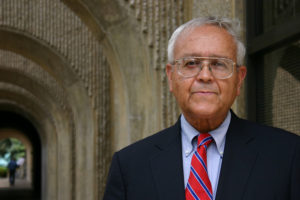Trump and Organized Labor on Collision Course

President-elect Donald Trump will take a number of initiatives which, for the most part, will be designed to emasculate unions and collective bargaining. But like President Nixon, who enjoyed good relations with the old AFL craft unions, Trump’s infrastructure initiatives should buy him their goodwill through the promise of more jobs and thus conceivably diminish an otherwise hostile union response.
Trump will assuage Rust Belt union members who ignored their leaderships’ endorsement of Hillary Clinton, by renegotiating or withdrawing from NAFTA and declaring war on free-trade agreements. But that won’t bring back jobs.
One of the delicious ironies of 2016 is how parsimonious Republicans have been when it comes to expanding retraining, relocation and monetary assistance for free trade’s losers, especially given their opposition to President Obama’s proposed wage-insurance program for all displaced workers.
Make no mistake, despite Trump’s expressed concern for workers dismissed because of globalization, his proposed enormous tax cuts will leave little room for expanded assistance. His administration will work against organized labor unless Senate Democrats can slow down the train through filibuster.
Various Trump enterprises are engaged in litigation before the National Labor Relations Board (NLRB), raising conflict-of-interest problems for new appointees — and only this month that agency found a Trump hotel in Nevada to have violated labor law.
The first labor test may be the nomination of a ninth Supreme Court justice. That appointment, if confirmed by the Senate, will break a 4-4 tie in the Friedrichs v. California Teachers Association case pending in the high court.
Before Justice Antonin Scalia’s death, at least five justices were poised to hold that public-employee unions could not constitutionally enter into so-called “fair-share” agreements (authorized in at least 20 states), which require nonunion members to pay union dues as a condition of employment.
Republicans have long sought to reverse more than a half century of Supreme Court precedent so as to eliminate union power and the ability of the labor movement to fund the Democratic Party through union monies. A ninth justice can join four other conservatives and accomplish this objective through a new constitutional interpretation.
Under current constitutional standards, none of this would affect the more numerically challenged and less robust private-sector unions. But here, the Trump approach will be more overtly political to make good on the Republican platform adopted this summer and its “call for a national (right-to-work) law to protect economic liberty of the modern workforce.”
The fact that unions are obliged to represent all employees fairly means that there is an incentive to be nonunion under right-to-work laws which now cover half the states in the U.S. If no one is obliged to pay, there is no reason to do so given the burden that is thrust upon union members alone and the ability to obtain representation for nothing.
With a host of other matters on his plate, Trump may not have time for much more beyond an attempt to withdraw pending Department of Labor directives to allow more workers the right to overtime pay — a process already teed up by a nationwide federal court injunction entered against it in Texas.
And there could be more. For two decades congressional Republicans have been engaged in unrelenting warfare against the Clinton and Obama National Labor Relations boards.
The low hanging fruits of victory are two immediate appointments to the NLRB which will produce a Republican majority. But little can change until there is a Republican general counsel — the gatekeeper for all cases that go before the board itself, and there won’t be a vacancy until November 2017. That will test the patience of the firebrands who may demand red meat.
Finally, a recent NLRB decision providing that Columbia University teaching and research assistants are employees also may be vulnerable. Major litigation about this ruling is now pending at Yale University.
Now that the White House, Congress and soon the high court are in the hands of the Republicans, workplace-democracy principles enshrined over more than 81 years are imperiled. Only creative parliamentary techniques and public outrage can slow or stop this.
William B. Gould IV is the author of “Labored Relations: Law, Politics, and the NLRB.” He was chairman of the National Labor Relations Board in the Clinton administration. He is the Charles A. Beardsley Professor of Law, Emeritus at Stanford Law School.
This op-ed first appeared in the Seattle Times on November 30, 2016.
